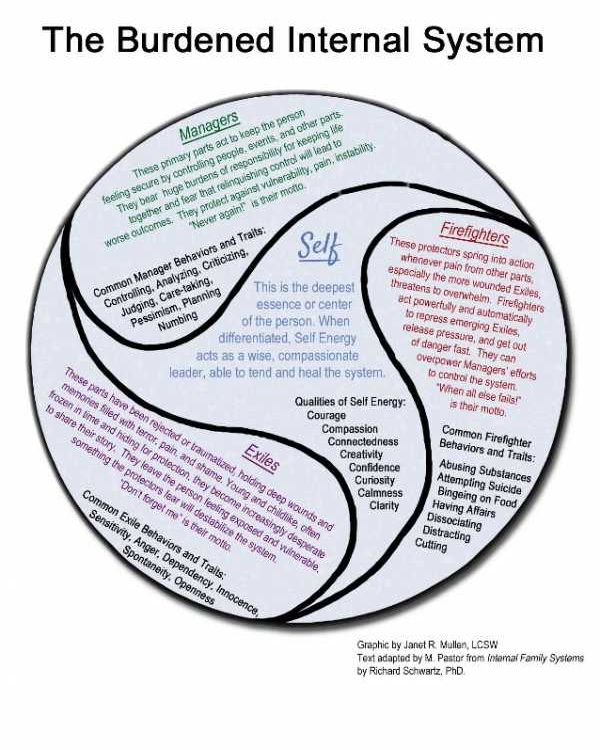Internal Family Systems (aka “IFS”) is a powerfully transformative, evidence-based psychotherapy that helps people heal by accessing and loving their protective and wounded inner parts. I completed the Internal Family Systems – Level One training (72 hours) in 2020 and completed my Level Two training (72 hours) in 2021, specializing in: “Using IFS with Couples: The ‘Intimacy from the Inside Out’ Model”.
Every major school of psychology recognizes that we all have different parts of our personalities: Freud calls his “id”, “ego” and “superego”, while Transactional Analysis calls theirs “parent”, “adult” and “child”.
As an IFS-trained therapist, I believe that, just like members of a family, our inner parts (called “managers”, “firefighters” and “exiles”) are forced – through trauma – from their original, helpful states into extreme, polarized roles. Here’s a brief bio of each:
Exiles
Exiles are wounded parts of us feel intense pain, shame or fear. Managers and firefighters (see below) try to prevent this pain from getting too strong and overwhelming us. If you’ve ever felt “flooded” with intense emotions that were hard to manage, it’s your exile talking to you, asking for help.
Managers
Managers try to protect us by: (1) Keeping our lives as stable and safe as possible, so none of the exile’s painful or traumatic emotions leak out, and (2) Distracting us from the exile’s pain by shaming us into doing the “right” thing. If you are blaming or shaming yourself for something, your manager is in charge.
Firefighters
Managers want to punish us; Firefighters want to punish other people. When you’re feeling angry, it’s your Firefighters talking. Instead of feeling sad/scared/lonely/abandoned/hopeless, they cover up these emotions with anger. Sometimes, Firefighters distract us by engaging in “numbing” behaviors like overeating; alcohol, marijuana or recreational drug use; obsessive exercising, shopping or video game play.
The Self
The “Chief Executive Officer” of the internal family system is called the Self. Its job is to work with the Managers, Firefighters and Exiles to create a harmonious Internal Family System. The Self is your wisest, calmest and most grounded self. It’s curious, confident, courageous, creative and compassionate.
In IFS, every part has a positive intention – it only wants to help us – even if its actions are currently counterproductive. There is never any reason to fight with or try to eliminate a part: any “negative” or “self-sabotaging” parts are like wayward children who have lost their way. As an IFS-trained therapist, my job is to help you, the client, access your Self and – from a place of courage, compassion and curiosity – come to understand and heal your parts, creating a harmonious, happy, high-functioning Internal Family System.
Recently, IFS has begun popping up everywhere, from the bestselling memoir by Queer Eye’s Jonathan Van Ness to an essay on Oprah.com by Elizabeth Gilbert of Eat Pray Love fame to podcasts by Alanis Morissette and Van Ness to Gwyneth Paltrow’s lifestyle site Goop. British cartoonist Mardou is publishing an ongoing series of comics about it. Pioneering neuroscientist Ed Boyden recently revealed that although he has devoted his professional life to studying the brain using optogenetics (genetically modifying animals so their neurons can be controlled with light), he studies his own mind using IFS therapy.
The originator of IFS, Richard Schwartz, PhD., likes to joke that he is planning to rewrite the Diagnostic and Statistical Manual of Mental Disorders (DSM-5) – psychiatry’s “bible” – to explain the basis of each disorder in non-pathologizing terms of protectors and exiles, thereby challenging the dominant “chemical imbalance” view.
Experts in conflict resolution, anti-racist education, high school guidance counseling, mediation, 12-step addiction recovery, and a growing list of other fields have begun adopting IFS techniques and developing pilot programs based around its principles. Just as important, Dr. Schwartz wants IFS to transform the way we connect to each other one-to-one.
“This is a radically different paradigm for understanding human beings than the ones that dominate our culture,” he says. “If it’s true that the things we think of as our inner enemies are really heroes stuck in time, this shift allows us to relate to ourselves with a lot more compassion and love, which translates to how we see outside ‘enemies’ and relate to them.”


